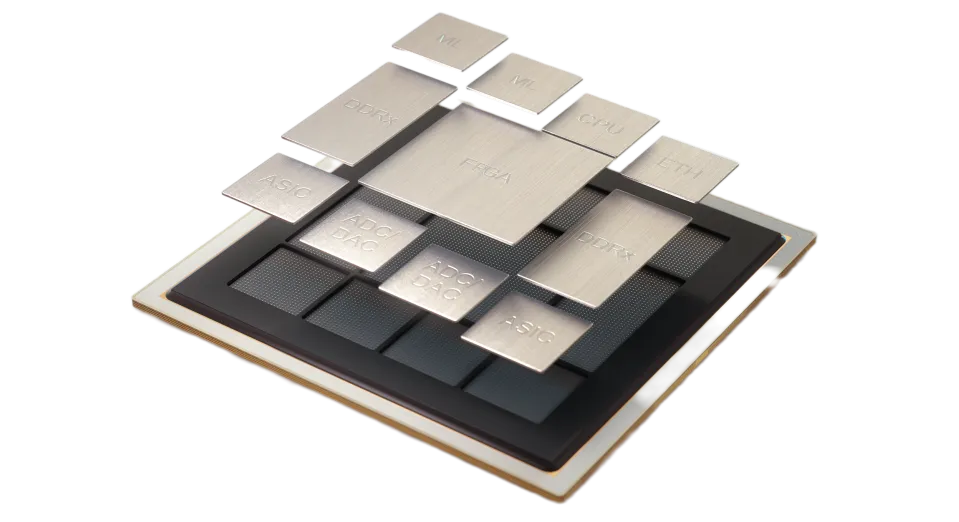Join the Chip Design Revolution
At Zero ASIC our mission is to revolutionize silicon system design. If you are looking to really make a difference, you should considering joining us. There is no other company in the industry quite like it!
Democratizing silicon.

Zero ASIC is building the world’s first composable chiplet platform, enabling billions of unique silicon systems to be assembled in hours from a catalog of off-the-shelf chiplets.
First demonstration of fully standardized chiplets, supporting O(m^n) system permutations (m=library size, n=substrate sockets).
Active 3D silicon substrates that decople compute and networking, enabling LEGO like system composition.
Sub 0.1 pj/bit chiplet communication efficiency.
Our platform of scalable processor IP generators enable rapid per application generation of bespoke FPGAs, CPUs, NOCs, and DSPs to meet the most stringent system requirements.
Push button 100% automated IP generation.
Performance scalable from edge to data-center.
Our IP generators have been used to tape out chips at 65nm, 28nm, 16nm, and 12nm.
To lower the barrier to custom ASICs, Zero ASIC developed SiliconCompiler, an open source hardware compilation platform. The principles behind SiliconCompiler are documented in this 2022 DAC paper.
Silicon proven flows supporting a large set of open source and proprietary EDA tools and PDKs.
Optimized cloud scale build infrastructure enable rapid design cycles.
Standardized manifests and design-as-code approach enable guarantee compilation determinism.
No lock in or hidden agendas!
Our Switchboard digital twin platform enables near real-time emulation, allowing teams to optimize the system hardware and software before committing to costly manufacturing cycles. The methodology behind our approach is detailed in this scientific paper.
Our chiplet optimized digital twin platform enables an order of magnitude faster build and run times compared to leading commercial emulators.
Our latency insensitive enable wafer scale designs and beyond.
Standardized model interfaces facilitate seamless transitions between high-level models (e.g. QEMU), cycle-accurate RTL simulators (e.g. Verilator), and hardware-in-the-loop systems (e.g. AWS F1 FPGAs).
Step 1: Emulate
Use Digital Twin platform to optimize hardware and software.
Step 2: Prototype
Build rapid chiplet based prototypes.
Step 3: Optimize
Optimize chiplet composition based on market feedback.
Step 4: Go To Market
Place a production purchase order and start manufacturing.
Profit!
At Zero ASIC our mission is to revolutionize silicon system design. If you are looking to really make a difference, you should considering joining us. There is no other company in the industry quite like it!
Today Zero ASIC announces the release of a new set of breakthrough open standard eFPGA cores with an advanced set of embedded BRAM and DSPs.
Cambridge, MA – September 17, 2025 – Zero ASIC, a U.S. semiconductor startup on a mission to democratize silicon, today announced the release of WildebeestTM, the world's highest performance open source FPGA synthesis tool. Wildebeest is the first open source logic synthesis solution with Quality of Results (QoR) comparable to proprietary vendor locked tools.
Today Zero ASIC is announcing availability of a production-grade, open-source static timing analysis (STA) flow for FPGAs, enabling analysis of complex multi-clock designs for the open-source FPGA design community.
Today I had the pleasure of giving a talk at the CHISIC (Chiplets Solutions for Custom IC Design) workshop in Boston. CHISIC focuses on providing insights and solutions related to chiplet technology and its application in custom IC design, specifically targeting the field of artificial intelligence. The workshop aims to help attendees learn about the latest advancements in chiplet architectures, connectivity, and associated design challenges.
Cambridge, MA – March 18, 2025 – Zero ASIC, a U.S. semiconductor startup on a mission to democratize silicon, today announced PlatypusTM, the world's first open standard eFPGA product. Platypus addresses a long standing critical issue of FPGA obsolescence and vendor lock that has put critical infrastructure at risk.
Composable chiplets represent a powerful new design approach with the potential of disrupting a large portion of the semiconductor market. This month I will be presenting ideas for how chiplets can be applied to a number of critical applications.
Zero ASIC is thrilled to announce Switchboard, a high-performance open-source framework for communication between RTL simulations, FPGA emulations, Python, and C++. Switchboard makes it possible to simulate large hardware systems in a distributed fashion, using a wide variety of model types, and to interact with the modeled systems from popular software languages.
The open source SiliconCompiler project we have been working on for a year is now officially live. I am so thankfully to my collaborators Noah Moroze and William Ransohoff for joining me on this journey! Check it out and tell me what you think. We soft launched over the weekend and at least the Twitterverse seemed to like it. We are at DAC in SF this week. If you are here, I hope to see you!